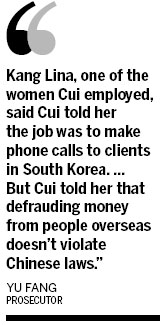Two stand trial for major phone scam in Shanghai
Updated: 2013-09-11 08:11
By Zhou Wenting in Shanghai (China Daily)
|
||||||||
Two men stood trial in a Shanghai court on Tuesday for their involvement in the city's first transnational phone scam targeting overseas residents.
Cui Yongzhe faces charges of defrauding people in South Korea out of more than 5 million yuan ($800,000) from February to June last year, according to prosecutors. Kang Huzhe is on trial for concealing and funneling money fleeced from the scam's victims. Both are Chinese of the Korean ethnic group and do not have criminal records.
According to the Ministry of Public Security, many criminals who perpetrate phone scams are now targeting residents of neighboring Asian countries because of increasing public awareness and recent crackdowns on scams in China.
To conduct the phone scams, Cui, a 29-year-old native of Ning'an, Heilongjiang province, employed a staff of seven who were fluent in Korean. The staff called people in South Korea posing as police officials, prosecutors and bank employees in Seoul, prosecutors said at Shanghai No 1 Intermediate People's Court.
Prosecutors did not state how many people Cui defrauded in South Korea.
Cui rented an apartment on Wuzhong Road in Shanghai's Minhang district in January last year and used it as an office and as accommodation for his staff of seven. The outgoing calls from the apartment appeared on victim's phones as phone numbers based in South Korea.

Scripts were provided for the staff, four of whom were women, and each targeted South Korean residents whose personal information Cui purchased on the Internet.
"Kang Lina, one of the women Cui employed, said Cui told her the job was to make phone calls to clients in South Korea.But Cui told her that defrauding money from people overseas doesn't violate Chinese laws," said prosecutor Yu Fang.
One of the scripts involved telling people that something was wrong with their bank accounts. Victims would then be asked to log into fake bank websites with their personal information.
Cui and his staff would then transfer the victim's money to bank accounts in South Korea controlled by Kang Huzhe. The money would then be forwarded to an Agricultural Bank of China account in China that was also under Kang's name. Finally, the money would be distributed to four accounts controlled by Cui.
Cui confessed to the scam in court on Tuesday.
"The reason I came to Shanghai was to commit such phone scams," said Cui.
Cui challenged the court's claims that he defrauded victims of 5 million yuan and said the amount was closer to 50,000 yuan.
"Not all the money transferred to my bank accounts from February to June last year was made from the scams. I won some of the money by gambling in casinos in South Korea," Cui said.
Kang, 34 and also from Ning'an, Heilongjiang province, denied he knew about the scam.
"There were frequent transactions of money between the bank accounts belonging to Cui and me because we borrowed money very often from each other. We used to be schoolmates and trusted each other," Kang told the court.
Kang said he was a businessman involved in the auto and wine industries.
In June last year, police in Liaoning province caught a cross-border phone scam targeting South Korean residents and captured 235 suspects scattered throughout Liaoning, Jilin, Fujian, Shandong and Guangdong provinces.
Exactly 184 of the suspects are Chinese nationals and the remaining suspects are Korean. They were charged with committing 1,200 instances of fraud worth more 100 million yuan, according to the Ministry of Public Security. Their methods are consistent with the methods Cui and Kang used in Shanghai.
zhouwenting@chinadaily.com.cn
(China Daily USA 09/11/2013 page5)
Most Viewed
Editor's Picks

|

|

|

|

|

|
Today's Top News
China's economy stable: Davos founder
Russia proposal likely to avert US air strikes
China's Hawaii goes fishing for talent
IPO to land deals in Hollywood
Timetable not set for Six-Party Talks
Li plots the economic course ahead
New iPhones a dud in China, so far
Kerry to meet Russian counterparts over Syria
US Weekly

|

|














